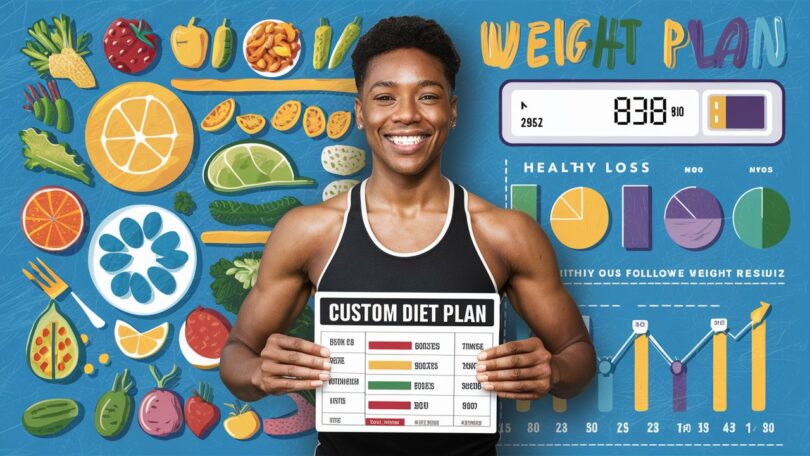Section 1: Mastering the Fundamentals of Weight Loss
Embarking on a weight loss journey can be daunting, but as someone well-versed in the intricacies of shedding pounds, I am here to guide you through the essentials. In this section, I will delve into the core principles of weight loss and equip you with invaluable insights to propel you towards your goals.
-
Embracing a Caloric Deficit
At the heart of successful weight loss lies the concept of a calorie deficit. This entails consuming fewer calories than your body expends in daily activities and functions. By creating this imbalance, your body taps into its fat stores for energy, facilitating effective weight reduction.
-
Unveiling Metabolism’s Impact on Weight Loss
Metabolism serves as a key player in determining how efficiently your body burns calories. It encompasses all biochemical processes within cells that convert food into fuel. To harness metabolism to your advantage, consider incorporating strategies like regular exercise and nutrient-rich foods into your routine.
Remember, achieving sustainable weight loss involves more than just tweaking caloric intake or ramping up physical activity; it necessitates striking a harmonious balance tailored to your individual body composition and lifestyle needs.
Section 2: Nourishing Your Body for Optimal Weight Management
When it comes to achieving weight loss, nutrition is key. It’s not just about counting calories or following trendy diets; it’s about nourishing your body with the right nutrients and making sustainable lifestyle changes. In this section, we will delve into the significance of nutrition in weight loss and offer valuable tips on how to make healthier food choices.
-
Understanding Macronutrients
Macronutrients are the essential components of our diet: carbohydrates, proteins, and fats. Each macronutrient serves a specific purpose in our bodies and can impact weight loss differently.
- Carbohydrates: These are our body’s main source of energy. Opt for complex carbohydrates like whole grains, fruits, and vegetables over refined sugars and processed foods.
- Proteins: Protein is crucial for building lean muscle mass and promoting fullness. Include lean sources such as chicken breast, fish, tofu, beans, and legumes in your meals.
- Fats: Healthy fats like avocados, nuts, seeds, and olive oil can help keep you satiated while providing important nutrients.
-
Embracing Clean Eating
Clean eating involves consuming whole foods that are minimally processed or free from additives. By focusing on fresh fruits and vegetables along with lean proteins and healthy fats mentioned above, you’ll be fueling your body with nutrient-dense foods that support weight loss.
-
Mastering Portion Control
Even if you’re eating nutritious foods, consuming them excessively can impede your weight loss journey. Pay attention to portion sizes by using smaller plates or measuring cups to ensure you’re not overeating.
Keep in mind that individual nutritional needs may vary based on factors such as age, gender, and activity level, so seeking guidance from a registered dietitian or nutritionist can assist in creating a personalized plan tailored specifically for you.
Section 3: The Role of Exercise in Weight Loss
Exercise is a vital component when it comes to achieving weight loss. By incorporating both cardiovascular and strength training exercises into your routine, you can effectively burn fat, build muscle, and enhance overall fitness. Let’s delve deeper into the benefits of each type of exercise and discuss key concepts related to weight loss.
-
Benefits of Cardiovascular Exercise
Cardio workouts such as running, cycling, swimming, or brisk walking are excellent for burning calories and elevating your heart rate. Here are some important advantages:
- Increased calorie expenditure: Cardio exercises boost your heart rate and energy expenditure during the workout.
- Improved cardiovascular health: Regular cardio sessions strengthen your heart muscles, lower blood pressure, and reduce the risk of chronic diseases like heart disease.
- Enhanced endurance: Aerobic activities improve lung capacity and oxygen delivery to muscles, allowing you to perform physical tasks with less fatigue.
-
Benefits of Strength Training
Strength training involves using resistance (such as weights or bodyweight) to challenge your muscles. Here’s why it is crucial for weight loss:
- Increased muscle mass: Building lean muscle through strength training helps increase metabolism since muscle burns more calories at rest than fat does.
- Improved body composition: Combining a caloric deficit diet plan with strength training exercises leads to positive changes in body shape by gaining muscle mass while losing fat.
- Enhanced bone density: Resistance exercises promote bone health by stimulating bone growth and reducing the risk of osteoporosis.
-
Understanding the “Fat Burning Zone”
You may have heard about exercising within a specific heart rate range known as the “fat burning zone.” While working out at lower intensities primarily utilizes stored fat as fuel compared to carbohydrates during higher-intensity workouts, total calorie burn remains crucial for weight loss.
To maximize calorie burn during exercise:
- Incorporate high-intensity interval training (HIIT): Alternating between intense exercise bursts and recovery periods can help you burn more calories in less time.
- Combine cardio and strength training: Including both types of exercises in your routine offers increased calorie expenditure, muscle building benefits, and overall fitness improvements.
-
The Significance of Consistency
Consistency is essential when it comes to exercising for weight loss success. Aim for at least 150 minutes per week of moderate-intensity aerobic activity or 75 minutes per week of vigorous-intensity aerobic activity along with two or more days dedicated to strength training targeting all major muscle groups.
Regular physical activity not only aids in weight loss but also enhances mood, reduces stress levels, improves sleep quality, and boosts overall well-being.
Before starting any new exercise program, especially if you have underlying health conditions or injuries that may require modifications, consult with a healthcare professional first.
Section 4: Psychological Aspects of Weight Loss
Embarking on a journey to lose weight involves more than just physical changes – it requires understanding the psychological aspects that play a crucial role in your success. Let’s explore the significance of maintaining a positive mindset, staying motivated and disciplined, and managing stress and sleep for effective weight loss.
-
Cultivating a Positive Mindset
A positive mindset is essential when striving for weight loss success. It serves as the cornerstone for keeping you motivated and focused on your goals. Here are some tips to help foster a positive outlook:
- Practice self-compassion: Be kind to yourself during setbacks, knowing they are part of the process but do not define your progress.
- Seek support: Surround yourself with friends or family who can offer encouragement and hold you accountable.
- Visualize success: Envision how achieving your weight loss goals will impact your life positively and picture yourself already there.
-
Maintaining Motivation and Discipline
While motivation kickstarts your journey, discipline is what sustains it. Here’s how to stay driven and committed throughout your weight loss endeavors:
- Set achievable goals: Break down larger objectives into smaller milestones that can be reached within specific timeframes.
- Find inner drive: Understand why losing weight matters personally – whether it’s for health improvements or confidence boosts – so you have intrinsic motivation pushing you forward.
- Establish routines: Form daily habits around healthy eating and exercise to make them second nature over time.
-
Managing Stress and Sleep for Weight Loss Success
Stress can hinder progress towards weight loss by impacting hormones like cortisol, leading to increased appetite and cravings for unhealthy foods. Similarly, inadequate sleep disrupts hormonal balance related to hunger regulation.
To effectively handle stress:
- Incorporate stress-relieving activities into your routine such as meditation, yoga, or deep breathing exercises.
- Prioritize quality sleep by establishing consistent bedtime rituals and creating an optimal sleeping environment.
Remember, achieving weight loss goes beyond physical transformations; nurturing mental well-being is equally vital for long-term results. By fostering positivity, staying motivated and disciplined, managing stress effectively, and prioritizing quality sleep, you’ll be better equipped to reach your desired weight loss goals successfully!
Section 5: Common Weight Loss Myths Debunked
Embarking on a weight loss journey can be daunting, especially with the plethora of myths and misconceptions that surround the topic. It’s crucial to sift through the misinformation and focus on evidence-based strategies for long-lasting results. Let’s debunk some of the most prevalent weight loss myths to set you on the right path.
-
Myth: Quick fixes and magic pills are effective for shedding pounds.
Truth: While it may seem enticing to opt for shortcuts or miracle solutions, sustainable weight loss requires a holistic approach. Healthy eating habits, regular exercise, and lifestyle modifications are key components in achieving lasting results.
-
Myth: Eliminating entire food groups or following extreme diets is necessary.
Truth: Restrictive diets can lead to nutrient deficiencies and are not sustainable in the long run. Instead of cutting out food groups entirely, focus on creating a well-rounded diet comprising fruits, vegetables, lean proteins, whole grains, and healthy fats.
-
Myth: Late-night eating causes weight gain.
Truth: The timing of your meals does not directly impact your weight; rather, it’s about overall caloric intake versus energy expenditure throughout the day. However, consuming heavy meals close to bedtime may disrupt sleep quality.
-
Myth: Skipping meals aids in weight loss.
Truth: Skipping meals can actually hinder your weight loss efforts by increasing hunger levels later on, leading to overeating. Fueling your body with nutritious meals regularly is essential for sustained progress.
-
Myth: All calories hold equal value.
Truth: While calorie consumption matters in managing weight, not all calories offer the same nutritional benefits or impact our bodies similarly. Opt for nutrient-dense foods rich in vitamins, minerals, and fiber for optimal health.
-
Myth: You can target fat reduction from specific areas through exercise alone.
Truth: Spot reducing fat from certain parts of your body isn’t possible solely through targeted exercises or dietary changes. Fat reduction occurs uniformly across one’s physique as a result of maintaining a caloric deficit.
-
Myth: Supplements aid significantly in long-term management.
Truth: Despite bold claims made by various supplements, scientific backing supporting their efficacy remains scarce. Prioritize making enduring lifestyle adjustments instead of relying heavily upon supplements.
-
Myth: Drinking water before mealtime facilitates significant reductions.
Truth: Although staying hydrated holds paramount importance, drinking water prior to mealtimes doesn’t necessarily translate into substantial losses. Nevertheless, this practice might assist portion control by inducing feelings of satiety.
By dispelling these common misconceptions surrounding weight loss, we aim to equip you with accurate information guiding you towards successful sustainable strategies. Remember, consistency, patience, and adopting healthier routines play pivotal roles in realizing desired outcomes.
Section 6: Creating a Personalized Weight Loss Plan
To successfully achieve weight loss, it is imperative to develop a personalized plan that caters to your unique needs. A generic approach will not suffice as each individual’s body and lifestyle are distinct. In this section, we will delve into the significance of establishing realistic objectives, formulating a well-rounded diet and fitness regimen, and monitoring your progress consistently.
-
Establishing Realistic Objectives
Prior to commencing your weight loss journey, it is crucial to set achievable goals that align with your personal requirements and capabilities. Rapidly shedding excessive pounds can have adverse effects on your health and may result in unsustainable behaviors. Instead, focus on gradual yet consistent advancements.
-
Formulating a Balanced Meal Strategy
Nutrition plays a pivotal role in weight reduction; hence, creating a balanced meal plan tailored to suit your dietary preferences is essential. Incorporate an array of fruits, vegetables, lean proteins, whole grains, and healthy fats into your daily intake while limiting consumption of processed foods laden with sugar and unhealthy fats.
-
Devising an Effective Workout Routine
Exercise serves as another fundamental aspect of any successful weight loss strategy by aiding in calorie expenditure while enhancing overall fitness levels and boosting metabolism. Strive for a mix of cardiovascular activities such as running or cycling for burning calories alongside strength training exercises like weightlifting or bodyweight workouts for muscle development.
-
Emphasizing Regular Progress Monitoring
Monitoring your progress is vital for maintaining motivation throughout the course of your weight loss endeavor. Keep tabs on measurements such as body weight, waist circumference, or changes in clothing fit over time rather than solely fixating on the number displayed on the scale since initial muscle gain can offset fat loss.
By adhering to these guidelines when crafting a personalized weight loss plan customized specifically for you:
- You will have attainable objectives.
- Your meals will offer optimal nutrition without compromising taste.
- Your exercise routine will effectively burn calories and enhance muscular strength.
- You can track progress continuously and make necessary adjustments accordingly.
Remember that achieving sustainable weight loss entails commitment, patience, and consistency in efforts – it’s more about the journey than reaching a destination per se. With an appropriate strategy at hand, you can realize lasting results towards shedding excess pounds while enhancing overall health and wellness simultaneously.
Section 7: Success Stories and Case Studies
Embarking on a weight loss journey can be daunting, but hearing success stories from individuals who have achieved their goals can provide the inspiration and motivation needed to kickstart your own transformation. These stories not only offer hope but also valuable insights into overcoming challenges along the way.
-
Real-Life Transformations
Let’s dive into some incredible weight loss success stories that will ignite your determination to reach your goals:
-
Sarah’s Triumph
After years of struggling with her weight and self-confidence, Sarah decided it was time for a change. Setting achievable goals and following a balanced meal plan, she lost an impressive 50 pounds in just six months through consistent exercise and dedication. Today, Sarah feels healthier, more energetic, and proud of her accomplishments.
-
John’s Journey
Battling obesity since childhood, John knew he needed to make significant lifestyle changes for his health. By incorporating regular exercise routines and making mindful food choices, he shed an astounding 80 pounds over a year! Now enjoying an active lifestyle filled with outdoor activities he once thought impossible.
-
-
Overcoming Common Challenges
Weight loss journeys are riddled with obstacles; here are some common hurdles people face:
- Plateaus: Progress may slow down or stall at times – staying committed to healthy habits is key to breaking through plateaus.
- Emotional Eating: Many turn to food as a coping mechanism for stress or emotional turmoil – learning alternative ways to manage emotions is crucial in overcoming this challenge.
-
Benefits Beyond Physical Transformation
While shedding excess pounds may start as aesthetic motivation, successful weight loss brings numerous other benefits:
- Improved Health Markers: Lower blood pressure levels, improved cholesterol profiles, reduced risk of chronic diseases like diabetes and heart disease.
- Increased Energy Levels: Shedding excess weight often leads to increased energy levels, allowing engagement in previously challenging activities.
- Enhanced Mental Well-being: Weight loss positively impacts mental health, increasing self-confidence, reducing anxiety and depression symptoms, and improving overall quality of life.
In conclusion, success stories serve as powerful reminders that achieving weight loss goals is possible with dedication and perseverance. By learning from others’ experiences and staying motivated throughout your journey, you too can achieve the healthy lifestyle you desire. Remember to focus on setting realistic goals, creating balanced meal plans, tailored exercise routines, and tracking progress regularly for accountability purposes. With the right mindset and support system in place, you’re well on your way to reaching your weight loss objectives!
Section 8: Choosing the Right Weight Loss Products and Services
Achieving Weight Loss: Making Informed Choices for Success
In the quest for weight loss, the market is flooded with a plethora of products and services. However, not all are created equal in terms of effectiveness and safety. It is imperative to select the right ones that align with your goals and prioritize your health.
-
The Role of Supplements
Supplements can be beneficial in supporting weight loss by providing essential nutrients and aiding in metabolism regulation. They should complement a healthy diet and exercise regimen rather than being solely relied upon for results. Look for supplements that have undergone scientific testing and approval from reputable organizations.
-
Choosing Reliable Weight Loss Programs
With numerous weight loss programs available, it can be overwhelming to find the best solution for shedding pounds. When selecting a program, consider factors such as its success rate, customer feedback, endorsements from professionals, and evidence-based approaches. A trustworthy program will offer personalized guidance tailored to your individual needs.
-
Seeking Professional Guidance
Consulting registered dietitians or certified personal trainers can significantly enhance the effectiveness and safety of your weight loss journey. These experts possess extensive knowledge of nutrition, exercise physiology, behavior change strategies, and can create customized plans based on your specific circumstances.
Remember that sustainable weight loss requires long-term lifestyle changes rather than quick fixes or miracle pills promising instant results. By making informed decisions regarding supplements, opting for reputable programs/services supported by scientific research, and seeking professional advice when necessary, you’ll pave the way for success on your weight loss journey.








Leave a Comment